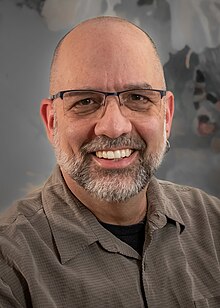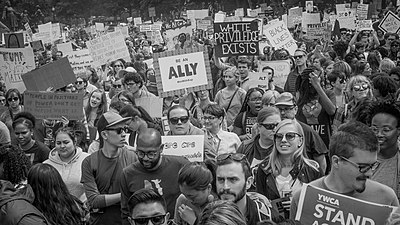
Intersectionality is a sociological analytical framework for understanding how groups' and individuals' social and political identities result in unique combinations of discrimination and privilege. Examples of these factors include gender, caste, sex, race, ethnicity, class, sexuality, religion, disability, height, age, weight and physical appearance. These intersecting and overlapping social identities may be both empowering and oppressing. However, little good-quality quantitative research has been done to support or undermine the practical uses of intersectionality.

Sociology of the family is a subfield of the subject of sociology, in which researchers and academics study family structure as a social institution and unit of socialization from various sociological perspectives. It can be seen as an example of patterned social relations and group dynamics.
Rachel Sherman is an associate professor of sociology at the New School for Social Research. Her first book, Class Acts: Service and Inequality in Luxury Hotels, analyzes how workers, guests, and managers in luxury hotels make sense of and negotiate class inequalities that marked their relationships. Her second book, Uneasy Street: The Anxieties of Affluence, explores the lived experience of privilege among wealthy and affluent parents in New York City.
Barbara Reskin is a professor of sociology. As the S. Frank Miyamoto Professor of Sociology at the University of Washington, Reskin studies labor market stratification, examining job queues, nonstandard work, sex segregation, and affirmative action policies in employment and university admissions, mechanisms of work-place discrimination, and the role of credit markets in income poverty and inequality.
Occupational inequality is the unequal treatment of people based on gender, sexuality, age, disability, socioeconomic status, religion, height, weight, accent, or ethnicity in the workplace. When researchers study trends in occupational inequality they usually focus on distribution or allocation pattern of groups across occupations, for example, the distribution of men compared to women in a certain occupation. Secondly, they focus on the link between occupation and income, for example, comparing the income of whites with blacks in the same occupation.
Occupational segregation is the distribution of workers across and within occupations, based upon demographic characteristics, most often gender. Other types of occupational segregation include racial and ethnicity segregation, and sexual orientation segregation. These demographic characteristics often intersect. While a job refers to an actual position in a firm or industry, an occupation represents a group of similar jobs that require similar skill requirements and duties. Many occupations are segregated within themselves because of the differing jobs, but this is difficult to detect in terms of occupational data. Occupational segregation compares different groups and their occupations within the context of the entire labor force. The value or prestige of the jobs are typically not factored into the measurements.
Evelyn Seiko Nakano Glenn is a professor at the University of California, Berkeley. In addition to her teaching and research responsibilities, she served as founding director of the university's Center for Race and Gender (CRG), a leading U.S. academic center for the study of intersectionality among gender, race and class social groups and institutions. In June 2008, Glenn was elected president of the 15,000-member American Sociological Association. She served as president-elect during the 2008–2009 academic year, assumed her presidency at the annual ASA national convention in San Francisco in August 2009, served as president of the association during the 2009–2010 year, and continued to serve on the ASA governing council as past-president until August 2011. Her presidential address, given at the 2010 meetings in Atlanta, was entitled "Constructing Citizenship: Exclusion, Subordination, and Resistance", and was printed as the lead article in the American Sociological Review.

Sociology is the scientific and systematic study of human society that focuses on society, human social behavior, patterns of social relationships, social interaction, and aspects of culture associated with everyday life. Regarded as a part of both the social sciences and humanities, sociology uses various methods of empirical investigation and critical analysis to develop a body of knowledge about social order and social change. Sociological subject matter ranges from micro-level analyses of individual interaction and agency to macro-level analyses of social systems and social structure. Applied sociological research may be applied directly to social policy and welfare, whereas theoretical approaches may focus on the understanding of social processes and phenomenological method.

Michèle Lamont is a Canadian sociologist who is the Robert I. Goldman Professor of European Studies and a professor of Sociology and African American Studies at Harvard University. She is a contributor to the study of culture, inequality, racism and anti-racism, the sociology of morality, evaluation and higher education, and the study of cultural and social change. She is the recipient of the Gutenberg Award and the Erasmus award, for her "devoted contribution to social science research into the relationship between knowledge, power, and diversity." She has received honorary degrees from five countries. and been elected to the British Academy, Royal Society of Canada, Chevalier de l’Ordre des Palmes Academiques, and the Sociological Research Association. She served as president of the American Sociological Association from 2016 to 2017.
Robert Mason Hauser is an American sociologist. He is the Vilas Research and Samuel F. Stouffer professor of sociology emeritus at the University of Wisconsin–Madison, where he served as director of the Institute for Research on Poverty and the Center for Demography of Health and Aging.
Gender inequality in the United States has been diminishing throughout its history and significant advancements towards equality have been made beginning mostly in the early 1900s. However, despite this progress, gender inequality in the United States continues to persist in many forms, including the disparity in women's political representation and participation, occupational segregation, and the unequal distribution of household labor. The alleviation of gender inequality has been the goal of several major pieces of legislation since 1920 and continues to the present day. As of 2021, the World Economic Forum ranks the United States 30th in terms of gender equality out of 149 countries.
Barbara Risman is Professor and Head of Sociology at the University of Illinois at Chicago.
Paula S. England, is an American sociologist and Dean of Social Science at New York University Abu Dhabi. Her research has focused on gender inequality in the labor market, the family, and sexuality. She has also studied class differences in contraception and nonmarital births.

Reproductive labor or work is often associated with care giving and domestic housework roles including cleaning, cooking, child care, and the unpaid domestic labor force. The term has taken on a role in feminist philosophy and discourse as a way of calling attention to how women in particular are assigned to the domestic sphere, where the labor is reproductive and thus uncompensated and unrecognized in a capitalist system. These theories have evolved as a parallel of histories focusing on the entrance of women into the labor force in the 1970s, providing an intersectionalist approach that recognizes that women have been a part of the labor force since before their incorporation into mainstream industry if reproductive labor is considered.

SocArXiv is an online paper server for the social sciences founded by sociologist Philip N. Cohen in partnership with the non-profit Center for Open Science. It is an open archive based on the ArXiv preprint server model used for the natural sciences, mathematics, and computer science. The site describes itself as an "open archive of the social sciences, [which] provides a free, non-profit, open access platform for social scientists to upload working papers, preprints, and published papers, with the option to link data and code." It also hosts papers in the areas of arts and humanities, education, and law.
Even in the modern era, gender inequality remains an issue in Japan. In 2015, the country had a per-capita income of US$38,883, ranking 22nd of the 188 countries, and No. 18 in the Human Development Index. In the 2019 Gender Inequality Index report, it was ranked 17th out of the participating 162 countries, ahead of Germany, the UK and the US, performing especially well on the reproductive health and higher education attainment indices. Despite this, gender inequality still exists in Japan due to the persistence of gender norms in Japanese society rooted in traditional religious values and government reforms. Gender-based inequality manifests in various aspects from the family, or ie, to political representation, to education, playing particular roles in employment opportunities and income, and occurs largely as a result of defined roles in traditional and modern Japanese society. Inequality also lies within divorce of heterosexual couples and the marriage of same sex couples due to both a lack of protective divorce laws and the presence of restrictive marriage laws. In consequence to these traditional gender roles, self-rated health surveys show variances in reported poor health, population decline, reinforced gendered education and social expectations, and inequalities in the LGBTQ+ community.
Jennie E. Brand is an American sociologist and social statistician. She studies stratification, social inequality, education, social demography, disruptive events, and quantitative methods, including causal inference. Brand is currently Professor of Sociology and Statistics at the University of California, Los Angeles (UCLA), where she directs the California Center for Population Research and co-directs the Center for Social Statistics.
Christine L. Williams is an American sociologist. She is a professor of Sociology and the Elsie and Stanley E. (Skinny) Adams Sr. Centennial Professor in Liberal Arts at the University of Texas at Austin. Her areas of specialization include gender, sexuality, and workplace inequality. Her research primarily involves gender discrimination at work.
Joya Misra is Professor of Sociology and Public Policy, University of Massachusetts, Amherst.
Madonna Harrington Meyer is an American sociologist, author, and academic. She is a University Professor at Syracuse University, Laura J. and L. Douglas Meredith Professor of Teaching Excellence, and Professor of Sociology at the Maxwell School of Citizenship and Public Affairs. She is a Senior Research Associate at the Center for Policy Research, Faculty Research Affiliate at the Lerner Center, and Faculty Affiliate at the Aging Studies Institute of Syracuse University.







